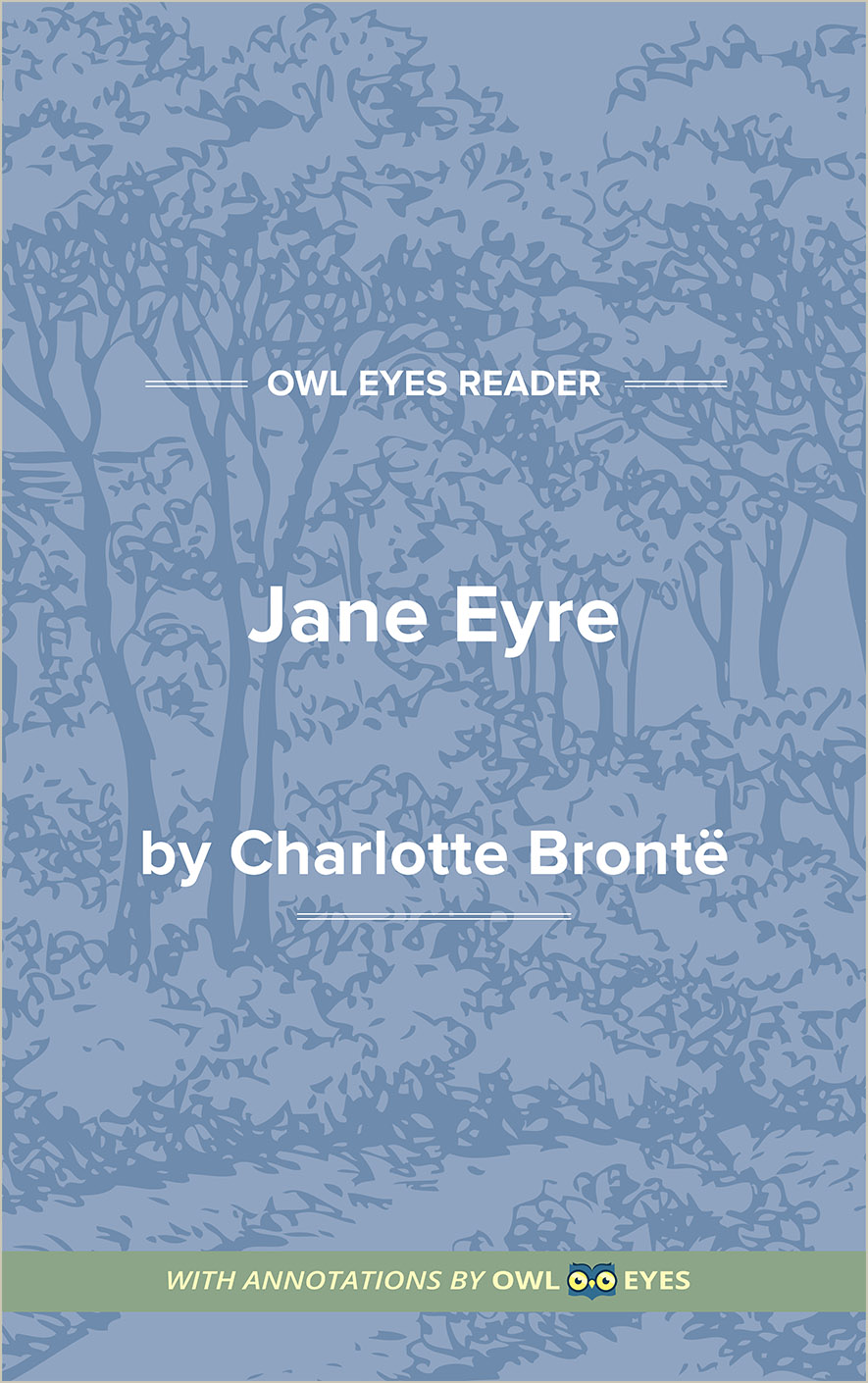Analysis Pages
Vocabulary in Jane Eyre
Vocabulary Examples in Jane Eyre:
Chapter II
🔒"Abigail..." See in text (Chapter II)
Chapter V
🔒"Babel clamor of tongues..." See in text (Chapter V)
Chapter VII
🔒"Rubicon..." See in text (Chapter VII)
"starved..." See in text (Chapter VII)
Chapter VIII
🔒"Barmecide supper..." See in text (Chapter VIII)
Chapter IX
🔒"Resurgam..." See in text (Chapter IX)
Chapter XI
🔒"“Mesdames, vous êtes servies!” adding; “j'ai bien faim, moi!”..." See in text (Chapter XI)
"Qu’ avez vous donc? lui dit un deces rats; parlez!..." See in text (Chapter XI)
"La Ligue des Rats: fable de La Fontaine..." See in text (Chapter XI)
"Mais oui, certainement...." See in text (Chapter XI)
"C'est là ma gouverante?..." See in text (Chapter XI)
Chapter XII
🔒"and again my raiment underwent scrutiny..." See in text (Chapter XII)
"par parenthese..." See in text (Chapter XII)
"Revenez bientôt ma bonne amie, ma chere Mdlle. Jeannette..." See in text (Chapter XII)
Chapter XIII
🔒"Where did you see Latmos?..." See in text (Chapter XIII)
"“N'est-ce pas, monsieur, qu'il y a un cadeau pour Mademoiselle Eyre, dans votre petit coffre?”..." See in text (Chapter XIII)
"“Et cela doit signifier,” said she, “qu'il y aura le dedans un cadeau pour moi, et peutêtre pour vous aussi, mademoiselle. Monsieur a parlé de vous il m'a demandé le nom-de ma gouvernaute, et si elle n’était pas une petité personne, assez mince et un peu pàle. J'ai dit qu'oui: car c'est vrai, n'est-ce pas, mademoiselle?”..." See in text (Chapter XIII)
Chapter XIV
🔒"“Monsieur, je vous remercie mille fois de votre bonté;” then rising, she added, “C'est comme cela que maman faisait, n'est-ce pas, monsieur?”..." See in text (Chapter XIV)
"“Est-ce que ma robe va bien?” cried she, bounding forward; “et mes souliers? et mes bas? Tenez, je croix que je vais danser!”..." See in text (Chapter XIV)
"Il faut que je l'essaie,’ cried she; ‘et à l'instant meme!’..." See in text (Chapter XIV)
"et j'y tiens..." See in text (Chapter XIV)
"nonnette..." See in text (Chapter XIV)
"tê-te-à-tête..." See in text (Chapter XIV)
"Oh ciel! Que c'est beau!..." See in text (Chapter XIV)
"tiens-toi tranquille, enfant; comprends-tu?..." See in text (Chapter XIV)
"Ma boîte! ma boîte!..." See in text (Chapter XIV)
"petit coffre..." See in text (Chapter XIV)
Chapter XV
🔒"beauté mâle..." See in text (Chapter XV)
"roué of a vicomte..." See in text (Chapter XV)
"Mon ange..." See in text (Chapter XV)
"inamorata..." See in text (Chapter XV)
"voiture..." See in text (Chapter XV)
"croquant..." See in text (Chapter XV)
"taille d'athléte..." See in text (Chapter XV)
Chapter XVI
🔒"ignis-fatuus-like..." See in text (Chapter XVI)
"Vos doigts tremblent comme la feuille, et vos joues sont rouges: mais, rouges comme des cerises!..." See in text (Chapter XVI)
"Qu'avez-vous, mademoiselle?..." See in text (Chapter XVI)
"sago..." See in text (Chapter XVI)
Chapter XVII
🔒"la belle passion..." See in text (Chapter XVII)
"the parson in the pip..." See in text (Chapter XVII)
"pére noble de théâtre...." See in text (Chapter XVII)
"Bon jour, mesdames...." See in text (Chapter XVII)
"“minois chiffoné”..." See in text (Chapter XVII)
"Est-ce que je ne puis pas prendre une seule de ces fleurs magnifiques, mademoiselle? Seulement pour completer ma toilette...." See in text (Chapter XVII)
"et alors quel dommage!..." See in text (Chapter XVII)
"Mais oui, mademoiselle: voilà cinq ou six heures que nous n'avons pas mangé...." See in text (Chapter XVII)
"Chez maman,” said she, “quand il y avait du monde, je le suivais partout, au salon et à leurs chambres; souvent je regardais les femmes de chambre coiffer et habiller les dames, et c’était si amusant: comme cela on apprend...." See in text (Chapter XVII)
"Elles changent de toilettes..." See in text (Chapter XVII)
Chapter XVIII
🔒"Mother Bunches..." See in text (Chapter XVIII)
"Voilà, Monsieur Rochester, qui revient!..." See in text (Chapter XVIII)
"Bridewell..." See in text (Chapter XVIII)
"pantomime of a marriage..." See in text (Chapter XVIII)
Chapter XX
🔒"volatile salts..." See in text (Chapter XX)
"Carthage..." See in text (Chapter XX)
Chapter XXII
🔒"prête à croquer sa petite maman Anglaise..." See in text (Chapter XXII)
"bon soir..." See in text (Chapter XXII)
Chapter XXIV
🔒"pour me donner une countenance..." See in text (Chapter XXIV)
"du reste, il n'y avait pas de fées, et quand même il y en avait..." See in text (Chapter XXIV)
"Contes de fée..." See in text (Chapter XXIV)
"un-vrai menteur..." See in text (Chapter XXIV)
"Oh, qu’ elle y sera mal—peu comfortable!..." See in text (Chapter XXIV)
Chapter XXV
🔒"hypochondriac..." See in text (Chapter XXV)
Chapter XXVI
🔒"Creole..." See in text (Chapter XXVI)
Chapter XXVII
🔒"pass through a fair scene to the scaffold..." See in text (Chapter XXVII)
Chapter XXVIII
🔒"Ich wage die Gedanken in der Schale meines Zornes und die Werke mit dem Gewichte meines Grimms...." See in text (Chapter XXVIII)
"Da trat hervor Einer, anzusehen wie die Sternen Nacht...." See in text (Chapter XXVIII)
Chapter XXIX
🔒"Marsh End..." See in text (Chapter XXIX)
Chapter XXX
🔒"stern allusions to Calvinistic doctrines..." See in text (Chapter XXX)
Chapter XXXI
🔒"Peri..." See in text (Chapter XXXI)
"Lot's wife..." See in text (Chapter XXXI)
Chapter XXXII
🔒"the 5th of November..." See in text (Chapter XXXII)
"lusus naturæ..." See in text (Chapter XXXII)
Chapter XXXIV
🔒"“Come over and help us!”..." See in text (Chapter XXXIV)
"paysannes and Bauerinnen..." See in text (Chapter XXXIV)
Chapter XXXVIII
🔒"bone of his bone, and flesh of his flesh..." See in text (Chapter XXXVIII)

